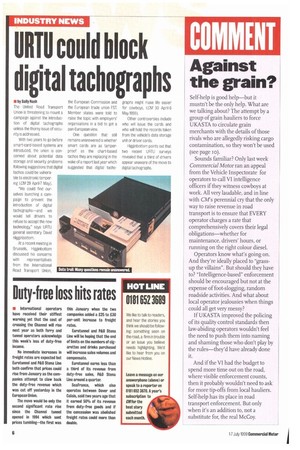Against the grain?
Page 8

If you've noticed an error in this article please click here to report it so we can fix it.
Self-help is good help—but it mustn't be the only help. What are we talking about? The attempt by a group of grain hauliers to force UKASTA to circulate grain merchants with the details of those rivals who are allegedly risking cargo contamination, so they won't be used (see page rc.).
Sounds familiar? Only last week Commercial Motor ran an appeal from the Vehicle Inspectorate for operators to call VI intelligence officers if they witness cowboys at work. All very laudable, and in line with CMs perennial cry that the only way to raise revenue in road
transport is to ensure that EVERY operator charges a rate that comprehensively covers their legal obligations—whether for maintenance, drivers' hours, or running on the right colour diesel.
Operators know what's going on. And they're ideally placed to "grassup the villains". But should they have to? "Intelligence-based" enforcement should be encouraged but not at the expense of foot-slogging, random roadside activities. And what about local operator jealousies when things could all get very messy?
If UKASTA improved the policing of its quality control standards then law-abiding operators wouldn't feel the need to push them into naming and shaming those who don't play by the rules—they'd have already done it.
And if the VI had the budget to spend more time out on the road, where visible enforcement counts, then it probably wouldn't need to ask for more tip-offs from local hauliers. Self-help has its place in road transport enforcement. But only when it's an addition to, not a substitute for, the real McCoy.
















































































































